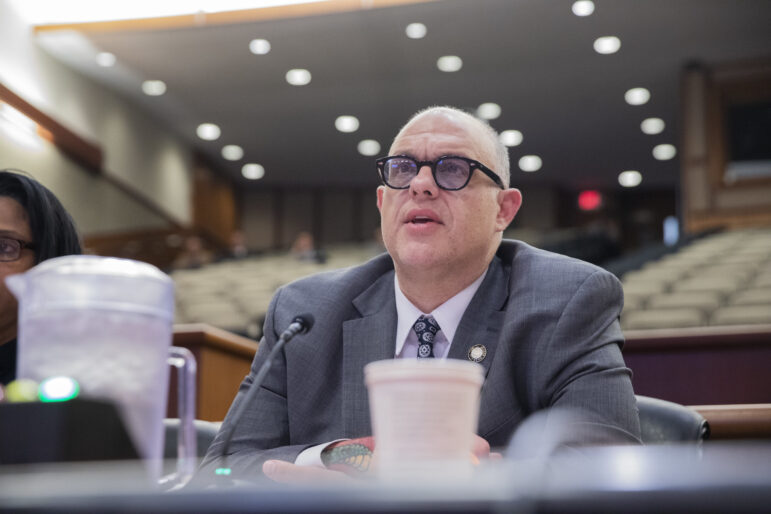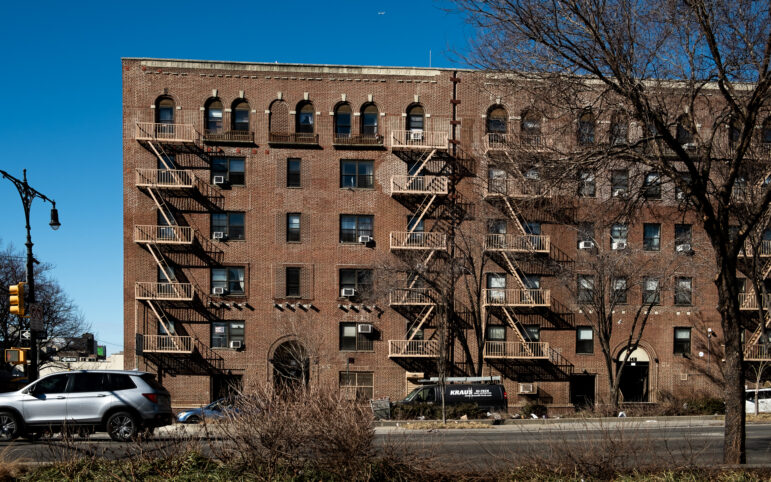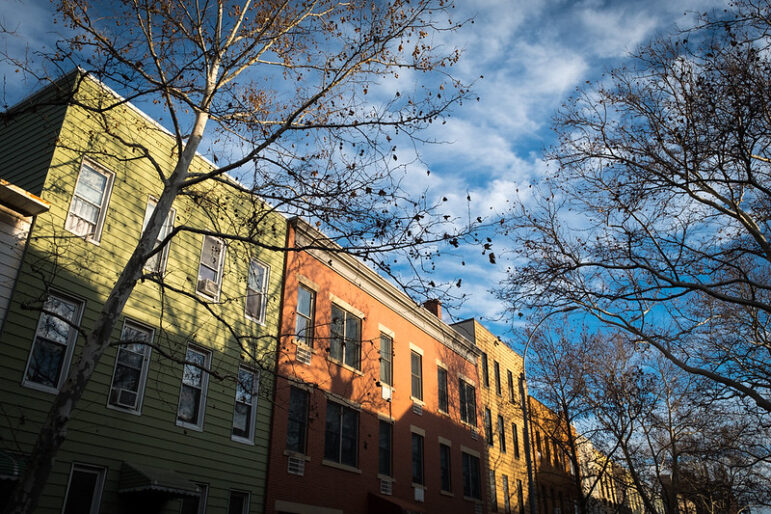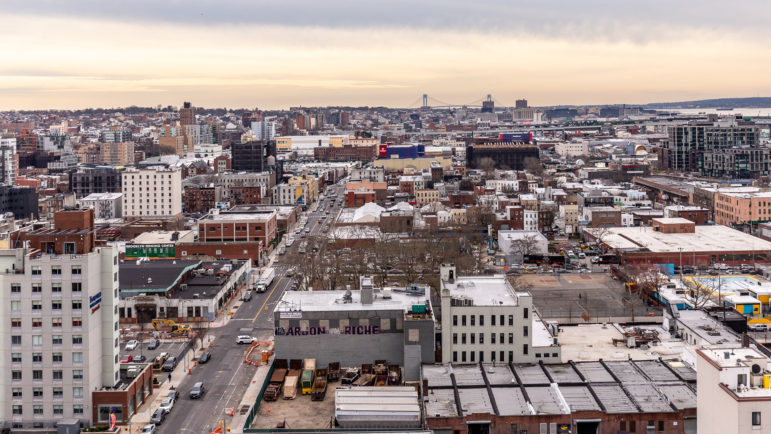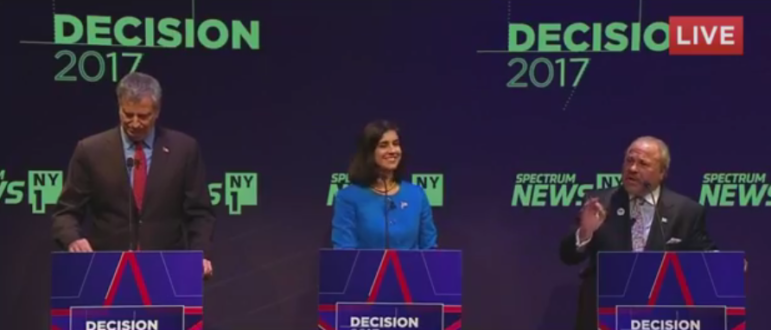
CFB/NY1
The mayor, Assemblywoman Malliotakis and Mr. Dietl at the first debate.
What had been a predictable and low-wattage mayoral campaign has been transformed in the past five days—first by the uproar over testimony about the mayor’s fundraising and then by the tragic deaths of eight people in an apparent attack on the West Side bike path on Tuesday afternoon.
Both sets of developments introduce volatile elements into the Wednesday night’s second and final debate of the general election campaign.
The allegations by former Bill de Blasio donor and bundler Jona Rechnitz—which indicated a deeper relationship to the mayor than de Blasio has acknowledged—and City Hall’s dismissive response to them eroded the sense of inevitability that had attached to the mayor’s re-election campaign.
Reform Party candidate Sal Albanese called for Gov. Cuomo to appoint a special prosecutor. Independent candidate Bo Dietl asked Attorney General Jeff Sessions to re-open a federal probe into the mayor. Republican Nicole Malliotakis demanded that Campaign Finance Board withhold the mayor’s public financing because of the allegation that Rechnitz had used straw donors. The Citizen’s Union—whose chairman Randy Mastro, it is worth noting, is a highly respected lawyer but also the guy who led an inquiry into Bridgegate that the New York Times dubbed a “whitewash” for Gov. Chris Christie—withheld its endorsement of de Blasio because of the revelations.
The horrible events on the West Side on Halloween were first and foremost a human tragedy, and a reminder of how fragile life is. It’s crass to think about the political impact of senseless violence, but it is true that incidents like that permit leaders to display their skills as crisis managers and public consolers. When tragedies happen in the midst of a campaign, opposing candidates have to figure out whether to salute or criticize, with little margin for error and long memories to think about. After September 11, Mark Green agreed to support an extended term for Ground Zero hero Rudy Giuliani, a miscalculation that de Blasio used as ammo against Green eight years later. Cuomo’s tacky comment that George Pataki had merely held Giuliani’s coat after the 2001 attacks severely wounded his first run for governor in 2002.
Meanwhile, there is no firm public sense of where the campaign stands. There’s been a remarkable lack of polling on this year’s mayoral race: only three polls by Quinnipiac, the leading local survey service, since May 18—a period over which the Q poll released 13 polls in 2013, six in 2009 and 10 in 2005. Campaigns likely have internal polls, but the rest of us really have no idea if Malliotakis et al were closing the gap or de Blasio was sealing the deal as we came into the final stretch, let alone what the impact of the last few days might be.
All that said, Wednesday night’s debate is suddenly very important. Here are some things to look out for:
1. Jona Rechnitz’s name will be mentioned even more than Donald Trump’s. Expect Dietl and Malliotakis to bring up the mayor’s former bundler as often as they possibly can. After a week when it sometimes seemed like the mayor, not Norman Seabrook, was on trial in that Manhattan courtroom (though, crucially, without the ability to cross examine his accuser), it will be interesting to see how moderator Maurice DuBois and the media panelists handle the issue. Will they press the mayor to divulge details that he has so far declined to provide?
2. But Donald Trump’s name will be mentioned. De Blasio went right to the “they voted for Trump” line against both Dietl and Malliotakis when the three met for a debate last month. The indictment of the president’s former campaign chairman, the feud with Jeff Flake, the White House chief of staff’s odd regret that we didn’t compromise over slavery 156 years ago — these recent events haven’t made the prez any more popular here, so expect the mayor to draw those connections. It’s not the most imaginative or precise line of argument, but his opponents haven’t given him much else to attack (see point 3).
3. Mayor De Tails-io. De Blasio’s command of policy details helped him weather the rambunctious first debate and since then he’s only given himself more to talk about, with the expansion of the housing plan and the constituent parts—involving nonprofit developers, Mitchell-Lama housing and homes for senior citizens—that he has rolled out in the last week. Malliotakis, meanwhile, has done little to fill in the policy gaps. One example: A couple weeks back, she had an event to highlight the problem of property taxes, which de Blasio has done very little to correct. Her proposal? If elected she’ll appoint a task force to come up with a proposal … which is not too different from the vague promises the mayor has made to address the issue. So, expect de Blasio to dive deep into policy as a way of contrasting his approach with his rivals’.
4. Playing the crowd. Dietl’s bombastic performance in the first debate both fueled and fed off a raucous crowd at Symphony Space. Wednesday’s debate is at the smaller auditorium at the CUNY Graduate Center, and after the October 10 debate nearly descended into debacle because of the crowd noise, you can expect organizers to keep tighter control over the audience this time. One wonders if that will have any effect on Dietl, and whether that effect will be helpful, permitting him to charge up his base while not scaring away voters who dislike the other two candidates but don’t want to elect someone whose version of “My fellow New Yorkers …” is “Go Yankees!” Dietl is the X factor in this race—a non-politician with some name recognition, an interesting set of policy ideas and a decent amount of money (although he has spent just about all of it). He is very unlikely to win a three-way contest but he could certainly make the Election Night math more interesting.
5. The terrorist attack. If reports over the next day confirm the broad initial outlines of the West Side incident, Dietl and Malliotakis have to decide whether to link it to their broader (and largely misleading) complaint about rising crime and disorder in de Blasio’s New York, to pivot from one to another, or just not to go there at all.
Wednesday’s debate is at 7 p.m. 7:00 p.m. on WCBS, WLNY-TV 10/55 (Spanish), 1010 WINS and NewsRadio 880.



